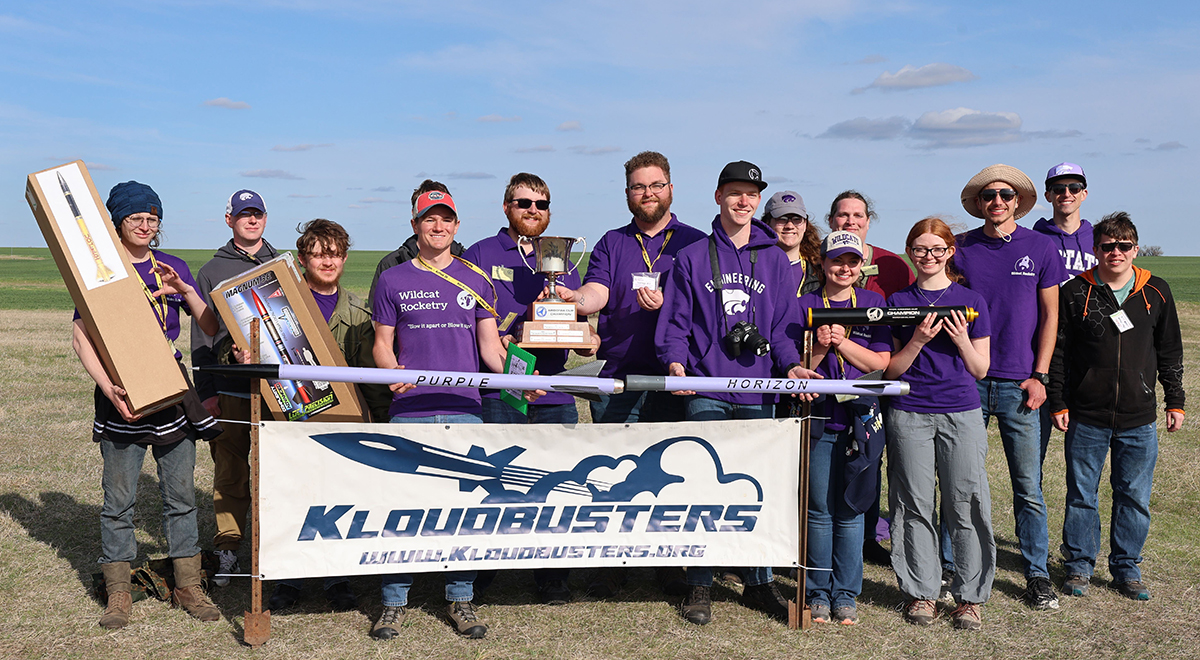Wildcat Rocketry wins national competition, breaks altitude world record

Members of the Wildcat Rocketry team pose with the Argonia Cup trophy and competition rockets, including the winning "Purple Horizon" rocket, which broke a world record for altitude for a commercial-staged L-impulse rocket by reaching an altitude of 35,439 feet. | Download this photo.
Kansas State University's Wildcat Rocketry team made history at the 2025 Argonia Cup by taking first place in the national collegiate rocketry competition and breaking a world record.
K-State's student team is the first from Kansas to win the competition — this year from among 20 collegiate teams — and the club's competition rocket, "Purple Horizon," broke the world record for altitude on a commercial-staged L-impulse rocket, reaching 35,439 feet and a maximum speed of 1,050 miles per hour.
The Wildcat Rocketry team scored a 61,778 to beat out second-place finisher CU in Space from the University of Colorado, Boulder, which finished with an altitude of 24,290 and a score of 44,759. In third place was Purdue Space Program High Altitude, which had an altitude of 23,572 and a score of 44,692.
"We have been chasing this competition since we first started competing in 2018," said Brian Parks, fall 2024 graduate in computer engineering and previous club president, Shawnee. "Through our time competing, we have learned hundreds of lessons big and small that have led us to this point. From not being able to hit the altitude requirement to now breaking the Tripoli staged L-impulse altitude record, it just shows how far this team has come."
While K-State's launch broke the current individual world record for altitude, the team does not hold the record because it was set as a team, not by an individual.
The Argonia Cup challenges teams to fly a two-stage rocket to a minimum altitude of 9,000 feet and have a nominal recovery, meaning no tangled parachutes or damage to any part of the rocket. If both of these conditions are met, the team receives a score based on altitude, payload size — in this case, the number of golf balls carried on board — and the size of the motors used.
While the team has been competing in this event since the club formed in 2018, last year's competition was the first time it met the conditions to receive a score, taking fourth place. Ben Monday, senior in mechanical engineering and current president of Wildcat Rocketry, Salina, said the club focused on altitude instead of payload size or motor size with this year's successful flight.
"All of our electronics, recovery and parachutes worked exactly like they were supposed to, and our team was very efficient in its prep work," Monday said. "Both of those already give us huge advantages over other schools, but the biggest thing that went right for us was our interstage coast time."
Monday said the rocket managed to stay in a 20-degree cone between stages for 17 seconds, which was where other teams had issues.
"On our flight, we were fast enough and well enough built that we had only tilted 10 degrees by the time we lit our sustainer," Monday said. "This is a monumental difference that allowed us to gain an additional 5,000 feet of altitude."
Wildcat Rocketry is a competition team in the Carl R. Ice College of Engineering. The team's advisors are Mingjun Wei, recipient of the Harold O. and Jane C. Massey Neff Professorship in Mechanical Engineering and professor of mechanical and nuclear engineering, and Gennifer Riley, instructor, both in the Alan Levin Department of Mechanical and Nuclear Engineering
Additional members of Wildcat Rocketry include:
Jasmine Baldwin, junior in fisheries, wildlife, conservation and environmental biology, Bird City; Arthur Soper, freshman in mechanical engineering, Bucyrus; Phillip Shirkey, senior in mechanical engineering, Concordia; Eric Sprecker, junior in chemical engineering, Derby; Cameron Weeks, senior in mechanical engineering, Emporia; Erik Kaufman, sophomore in computer science, Halstead; Logan Gamble, senior in mechanical engineering, Hesston; Tyler Hogenkamp, junior in mechanical engineering, and Audrie McCollum, junior in human development and family science, both from Manhattan; Adam Riekeman, senior in mechanical engineering, Olathe; Carter Comer, freshman, in mechanical engineering, Shawnee; Hannah Harris, junior in mechanical engineering, and Cole Scheer, senior in mechanical engineering, both from Topeka; and Tannyr Singleterry, senior in computer engineering, Wichita.
###
News tip: Bird City, Bucyrus, Concordia, Derby, Emporia, Halstead, Hesston, Manhattan, Olathe, Shawnee, Topeka and Wichita, Kansas.
